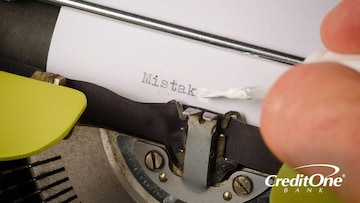You’ve probably heard about the importance of checking your credit reports regularly. It’s wise to stay current on the status of your credit so you know how well you’re doing managing it. However, an equally important reason for checking your credit report is to make sure the information contained within it is accurate.
The information in your credit report comes from multiple sources, including most if not all of the entities currently extending you credit. Beginning in July of 2017, stricter rules on public record collections require each citation to include name, address, and Social Security number, or birthdate to help avoid errors.
But mistakes—while not common—can occur. Some of them might be simple errors, such as incorrect contact information. Others, however, could negatively impact how creditworthy you appear to potential lenders, such as an incorrect record of past-due payments.
Should you ever come across erroneous information in your credit report, start by following these helpful tips:
Contact the credit reporting agency.
There are three major credit reporting agencies that produce your credit reports: Experian®, Equifax®, and TransUnion®. If you discover a mistake in one of your reports, contact the agency in question by using the following information:
| Bureau | Dispute Hotline | Online Form |
|---|---|---|
Experian | 800-509-8495 | |
Equifax | 866-349-5186 | |
TransUnion | 800-916-8800 |
- Make sure you have the latest version of your credit report that contains the error.
- Try to be as clear and specific as possible when describing the error, which will help the agency resolve the issue more quickly.
- If the mistake is something serious, such as an account reporting delinquencies you know are incorrect, you’ll want to gather supporting documents, such as payment receipts.
- Some “mistakes” may actually be fraud, such as a credit card account in your name that you don’t remember opening. Be prepared to not only open a dispute but to work with the agency’s fraud resolution team.
- Remember that, in producing credit reports, the agency primarily consolidates data from thousands of sources, so, if the mistake is valid, they will sincerely want to correct it.
- If the same mistake is on multiple credit reports, you should only need to contact one of the agencies. That agency should communicate with the others to resolve the issue across the board.
- Be proactive and follow up if you don’t hear anything back from the agency. If you fill out the online form and don’t hear anything back promptly, follow up with a phone call.
Contact the lender.
Immediately after contacting the credit reporting agency, you should also reach out to the lender.
- In a best-case scenario, the lender also recognizes the mistake and will work with you and the agency(ies) to correct it.
- Even if the proceeding bullet is not the case, you still want to inform the lender that you’re opening a dispute and provide copies of your supporting documents to them.
- If the lender continues reporting the same information to the credit reporting agency, the lender must include a notice of your dispute. You should request that they copy you on any correspondence with the agency.
In all honesty, disputing information in a credit report can be stressful and time consuming. The time it takes to resolve issues can take weeks or even months. But you can help yourself by staying on top of your credit reports with regular reviews and, if you’re especially concerned with fraud, by subscribing to a credit monitoring product such as Experian’s CreditCheck® Premium.
A little diligence up front could save you a lot of legwork on the back end.

![How to Dispute Errors in Your Credit Report [Infographic]](/content/dam/cob-corp-acquisition/images/articles/2021/02/104343 COC_61_DisputeErrors.jpg?imwidth=360)

